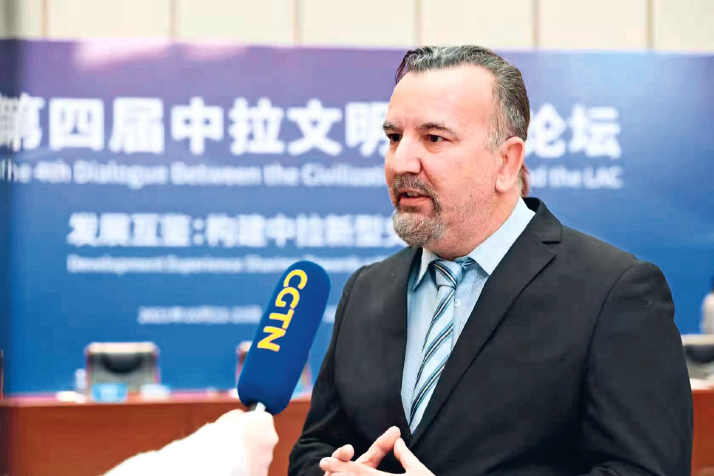| Lifestyle |
| Argentine professor promotes cultural ties between China and Latin America | |
|
|
 Zottele in an interview with China Global Television Network (COURTESY PHOTO)
From classroom to research, Esteban Zottele has been a faithful promoter of intercultural understanding between Latin America and China, fueled by passion and his own life story. In 2019, Zottele was awarded the Labor Medal of Jiangsu Province, and last year the distinction of Honorary Citizen of Changzhou, a city in Jiangsu, a testimony to his significant contributions throughout his nearly 20 years in China. These are two major awards for this scholar and teacher who has dedicated a large part of his life to the research on and promotion of ties between Latin America and China. First forays Though born in Argentina, Zottele's life has always been closely connected with China. He first developed an interest in the country when he was still living in Buenos Aires. "I began to take frequent trips to the city's Chinatown where, together with my father, we would visit different restaurants, markets and shops," he recalled. Although Chinese texts translated into Spanish were scarce and current news from China was practically non-existent at that time, this did not stop Zottele from continuing his exploration. Things soon materialized with his first visit to China, taking him to Beijing, Shanghai and Guangzhou. That first meeting whetted his appetite so Zottele, who'd also lived in Mexico for many years, decided to relocate to the Asian giant and study standard Chinese. "When I first came here, I felt that despite my linguistic limitations, I could still communicate with people," he recalled. "Whenever I asked something, people would be willing to help me and this willingness, this great quality, was another determining factor that brought me back in 2004," he added. Education and exploration Currently, Zottele, who has a Ph.D. in business administration from the Beijing-based Renmin University of China (RUC), is a professor at Changzhou University and a researcher with the school's Center for Latin American Studies. The university, founded in 1978, has more than 20,000 undergraduate students and another 4,000 graduate students. "The RUC School of Foreign Languages offers a degree in Spanish philology, and I teach classes on Latin American culture as well as on negotiation and business, my areas of specialty," he said. In addition, the Argentine teacher says that through the Center for Latin American Studies, they are permanently related to embassies, consulates and different educational institutions in Latin America, by constantly hosting conferences, creating translations and doing research. In 2020, for example, Zottele published the book Aproximaciones a la Franja y la Ruta (Belt and Road Approaches) together with his father, Dr. Aníbal Carlos Zottele, who is director of the Center for China-Veracruz Studies at the Universidad Veracruzana de México. "Much of my research and publications have to do with Latin America and the Belt and Road Initiative, leadership and intercultural competence," he said. In this sense, this last book tries to explain some of the opportunities that this initiative, which was proposed by China in 2013 to boost connectivity along and beyond the ancient Silk Road routes, offers Latin American countries from a bilateral point of view. Despite the great progress in studies and research of relations between Latin America and China, and the fact that China already has at least 50 Latin American study centers, challenges remain. One of them, according to Zottele, has to do with greater specialization. "We must conduct more research looking into a number of concrete issues, such as the greater inclusion of micro, small and medium-sized enterprises in the exchange between both regions, considering they represent more than 90 percent of the companies, but their participation in international trade is still small," he said. The Argentine further holds that intercultural leadership must continue to develop those aspects that concern cooperation between China and Latin America and the Caribbean in a way that "allows not only to prevent cultural differences from becoming an obstacle for cooperation, but that they can be strengthened to create cultural synergy."  An aerial view of Wujin District, Changzhou, Jiangsu Province, on August 6 (XINHUA)
Tied together Speaking about his Chinese students, Zottele pointed out their genuine interest that transcends merely learning the Spanish language and embraces the culture, economy and society of Latin America. For this reason, the professor explained, many continue to pursue a master's degree, or even a Ph.D., a fact largely due to the growing ties between Latin America and China. "Due to the increase in trade in recent years, exchanges in various areas such as politics, education, science and technology, and culture have expanded." Along with his role at Changzhou University, Zottele was one of the creators of the Association of Argentines in China, founded six years ago, and is also an honorary advisor to the Mexican Chamber of Commerce in China. "The fact my work relates to Mexico, Argentina and China gives me great satisfaction as I am able to contribute something to building a greater understanding between these wonderful countries and can add, to each project, a chapter of my own life story," he said. Zottele has lived in Changzhou for five years, together with his Chinese wife from Xi'an, Shaanxi Province. He pointed out that Changzhou, a city with more than 3,000 years of history, despite being relatively small compared to the imposing Chinese megalopolises, offers all kinds of comforts. "In the five years I have lived here, the city has constructed two new subway lines, so I can now get from the university to the railway station in less than half an hour and to Shanghai in almost an hour by bullet train." This city with its 5-million population also features a large number of tourist attractions, such as the Weidun Neolithic Ruins Park, the Red Plum Flower Pavilion, the Tianning Temple, and the Wenbi Pagoda. But aside from his particular affinity with Changzhou, Zottele is an admirer of China at large. "During all these years of living in China, I have been a fortunate witness of the great changes that have taken place here, but I have mainly observed the profound improvements in the people's quality of life which can be seen in all the details of daily life such as education, health, infrastructure and applied science and technology," he said. "The great transformations the country has realized, guided by the Communist Party of China, are both tangible and commendable." (Print Edition Title: A Devoted Life) Copyedited by Elsbeth van Paridon Comments to dingying@cicgamericas.com |
|
||||||||||||||||||||||||||||||
|
